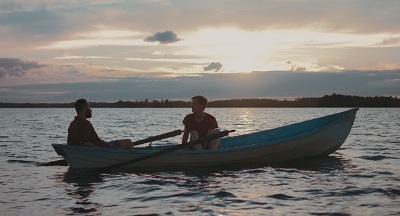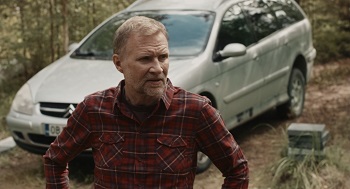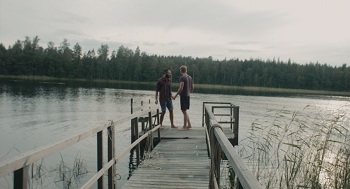
By Tom Ue.
With A Moment in the Reeds, London-based filmmaker Mikko Mäkelä seeks to fill the queer void in Finnish cinema: he returns, imaginatively and literally, to his native Finland through the character of Leevi (Janne Puustinen), who seeks to help his father Jouko (Mika Melender) repair their lakehouse. There, he meets the asylum seeker Tareq (Boodi Kabbani), who, because of barriers in language and race, is doubly ostracized. Mäkelä has studied English Literature and French at Nottingham University and University College London. He has directed music videos and fashion films and has worked as an editor for drama and commercials. In what follows, we discuss his thought-provoking debut, which had its world premiere at the 2017 BFI London Film Festival and is now available on DVD, on Blu-ray, and on demand.
Please note that details of the plot will be revealed in what follows.
Congratulations on A Moment in the Reeds, a wonderful and truly thought-provoking debut. Tell us about Wild Beast Productions, your production company.
I founded Wild Beast Productions with my producing partner James Watson a few years ago initially to produce music videos, fashion films and other promo content, but always with the view of ultimately moving into drama. Currently, we are developing a London-set queer drama/comedy series as well as a couple of other feature film projects.
You have said, in a number of places, that the story of A Moment in the Reeds is slightly autobiographical. Can you elaborate on this?
Leevi’s trajectory of leaving Finland, ostensibly to study abroad, but really to escape Finnish conservatism, close-mindedness and aversion to difference for a freer life elsewhere, closely resembles my own journey of leaving Finland at 18 to study in the UK. When Leevi returns, possibly for the first time in a couple of years, he is re-assessing his relationship to Finland from a new perspective afforded by time and distance, and it is this point of view of the returning emigrant that I have most closely borrowed from my own experience. I haven’t experienced the same kind of romantic chance encounter at the lakehouse (which is actually my family’s) that Leevi does in the film, but I certainly did also see it in a very new light through my British partner’s eyes, when I first brought him there some years ago.
You wrote the screenplay too! How did this evolve during production?
 On this film, I chose not to work from a traditional screenplay but, inspired by the likes of Drake Dormers, Joe Swanberg, Lynn Shelton as well as Ingmar Bergman, wanted to use the more collaborative and improvisational “scriptment” method: I wrote a detailed, 30-page outline of the film, containing descriptions of all the scenes and most of their beats; based on which I asked the actors to improvise the dialogue in their own words and idiom.
On this film, I chose not to work from a traditional screenplay but, inspired by the likes of Drake Dormers, Joe Swanberg, Lynn Shelton as well as Ingmar Bergman, wanted to use the more collaborative and improvisational “scriptment” method: I wrote a detailed, 30-page outline of the film, containing descriptions of all the scenes and most of their beats; based on which I asked the actors to improvise the dialogue in their own words and idiom.
In this film, I was aiming for a sense of almost documentary-like authenticity—to tell a story very firmly rooted in today’s society with characters that feel like real people, and so from the start I invited the actors to develop their characters in collaboration with me and, particularly in the case of Tareq, to draw on their own experiences and incorporate elements from their own lives. The scriptment was fairly quick to write and remained a malleable entity throughout. I knew from the start that I would, to an extent, be adapting it to the actors that were cast.
The writing really continued in the editing room (I cut the film for the most part myself) as this kind of method really relies on the scenes and performances being shaped and sculpted out of a very large amount of improvisational footage generated on set.
What was it like to shoot on location?
It certainly wasn’t glamorous. We lived in the same conditions as the characters of the film with no running water, and about 30km away from the nearest supermarket, except there were five of us living in the small lakehouse (another five crew members stayed at a more modernly equipped house 10 km away). But it was a great bonding experience for everyone and in a method-y way I think it really helped the actors to get into the right frame of mind.
So much of the film relies on its small cast, upon which the camera regularly scrutinizes through close-ups. Tell us about the casting.
We made the film at a very independent, microbudget level, so we didn’t have a casting director. And having lived abroad for nearly a decade, I lacked any connections to the Finnish film industry when setting out to make the film in the spring of 2016. Therefore, we started by posting an open casting-call on social media, and ended up getting a lot of responses. The two lead actors, however, were found via our Finnish producer Jarno Pimperi who knew them both and encouraged them to attend the casting. On a project that relied heavily on improvisation like this, I knew that I wanted to cast gay actors who would be able to draw on their own experiences in constructing their characters.
Were there particular challenges with shooting the more intimate scenes?
We shot the film as chronologically as possible, so by the time we got to shooting the first sex scene, a lot of trust had developed between the cast and crew, and it felt like a safe environment for filming these scenes. Of course there were some giggles involved, but overall we all felt a real responsibility to depict something that hadn’t ever been seen in Finnish cinema, i.e. gay sex, naturalistically and in a way that was truthful to the intense connection between Leevi and Tareq. In my approach to directing these scenes, emotion and mood prevailed over detailed choreography, which I hope shows in the final product.
The central protagonist Leevi is working on a dissertation on the poets Sarkia and Rimbaud. Having written many dissertations, and now supervised a few, I have to ask: What are the commonalities between these poets and what is the value of bringing them together here?
Rimbaud, of course, is one of the best-known queer poets. As a queer Francophile, Leevi is drawn to his work—or perhaps Rimbaud is one of the reasons for his Francophilia. Rimbaud represents the kind of decadent, bohemian life that Leevi somewhat naively longed for growing up in a small Finnish town, hiding his sexuality and starved of artistic life. He is emblematic of all of Leevi’s passions: poetry, queerness and France.
Sarkia was one of the first Finnish queer poets, working mainly in the 1930s and 40s, who travelled extensively around Europe, like Leevi seeking inspiration and a sense of freedom abroad. He was a prolific translator of poetry, including that of Rimbaud’s. One of his best-regarded translators is the poem Leevi tells Tareq about in the film ‘The Drunken Boat’. With this pairing, Leevi is looking at two poets who in their own ways were renegades, and perhaps is also trying to examine and reconcile two aspects of himself: his Finnishness as well as his rejection of it.
Leevi has a strained relationship with his father Jouko following the death of his mother, but Jouko’s responsibility in this event is never made clear. Why leave this open to interpretation?
 One of the major themes that I sought to explore in the film is the Finnish culture of silence and the difficulty, especially for men, of speaking honest, or at all, about their feelings. Though Leevi does make some effort to broach this topic with his father, he is also a victim of this culture and finds it difficult. Leevi’s reasons for blaming his father for his mother’s death are not necessarily as rational as they are emotional, and so I think that it is exactly since his feelings about his parents’ relationship are not discussed and talked through by father and son that the tension between the two remains in place. Here, I found an examination of the silence around trauma more interesting than detailing its circumstances.
One of the major themes that I sought to explore in the film is the Finnish culture of silence and the difficulty, especially for men, of speaking honest, or at all, about their feelings. Though Leevi does make some effort to broach this topic with his father, he is also a victim of this culture and finds it difficult. Leevi’s reasons for blaming his father for his mother’s death are not necessarily as rational as they are emotional, and so I think that it is exactly since his feelings about his parents’ relationship are not discussed and talked through by father and son that the tension between the two remains in place. Here, I found an examination of the silence around trauma more interesting than detailing its circumstances.
The film addresses so many pressing issues, including the role of military conscription and the plight of asylum seekers. Tareq, formerly an architect, has spent less than a year in Finland, and while he relishes the new civil liberties in the country, he is constantly held at a distance. He cannot find work in his field; and Jouko never shakes off his dislike for Tareq despite his demonstrated skill in, and hard work with, the renovations. Tell us about your research into asylum seekers and your commentary here.
During my research process, I did read a lot of material about and first-hand accounts by asylum seekers, and particularly LGBTQ refugees, but to ensure authenticity of representation on this project, as mentioned before, I approached the crafting of the characters in a more collaborative way, particularly in the case of Tareq. A gay Syrian himself, who had come to Finland as an asylum seeker, Boodi was able to infuse the role with detail and emotional authenticity drawn from his own lived experience as well as from the experiences of friends and acquaintances whom he interviewed in preparation for the shoot.
I had always viewed Finland, with its very homogenous, exceedingly white population, as having a problem with diversity and an aversion to difference of any kind, but when the arrival of Syrian and Iraqi refugees to Finland in 2015 provoked a widespread swell of xenophobia amongst parts of the population, with right-wing extremists openly protesting in the streets, it really felt like we were battling for the soul of the country. A deep chasm opened up between right-wing nationalists and those responding to the refugees with compassion. My depiction of Tareq’s struggle to feel comfortably at home in Finland is intended as a realistic reflection of the situation so many asylum seekers have found themselves in, held back by bureaucracy, not knowing Finnish, and by prejudice. It is of course intended as a critique of Finnish society for failing to be more welcoming towards those most in need.
Tareq has limited access to Finnish because he can’t register for a language course. This language barrier makes it especially difficult for him to find work. To what extent is it important to provide more than just asylum?
I think it’s absolutely crucial to provide adequate resources and support to help people coming in not only to adapt to the new country and society but to begin building a new life there. In larger cities, it’s possible to get by with just English, but if you are placed somewhere outside of Helsinki, not having any knowledge of Finnish would be very isolating. In 2015 and 2016, my mother, a retired Finnish language teacher, volunteered as a language instructor for in-coming asylum seekers. Finland is isolated and sparsely populated, with a harsh climate and a difficult, near impenetrable language, so I think adapting to the country would be a challenge for anyone coming from abroad, let alone someone coming from such a traumatic situation. I do think that providing asylum should also entail doing our best to make the person feel at home in the society.
The way of life in this part of the country seems threatened. One of the local stores had closed, and Leevi meets Pirjo, who speaks accusingly of people leaving Finland. What is your commentary there?
Up until the mid-20th century, Finland used to be a mostly agrarian, rural society, but over the last half-century, the countryside has gradually emptied out, with fewer and fewer young people or businesses remaining in these small villages. In my depiction of both Jouko and Pirjo, I wanted to capture something of the sense of the countryside and towns built around traditional industry feeling “left behind” by the socio-economic developments of modernity and globalisation.
Intrinsically linked to Finnish society’s aversion to difference, there is a culture of humility in the country, that frowns on anyone who dares to try to stand out from the crowd, or reach for something different, “foreign” in their lives. We are taught from a very young age to believe that to be born into Finland with its “welfare state” is like “winning the lottery”, so anyone who chooses to leave Finland for another country is viewed with suspicion, almost as being a “defector”. Upon leaving Finland over a decade ago now, I certainly had conversations like this. It is a very young, insecure nation, with only a century of independence from Russian and Swedish rule.
Jouko himself faces many external pressures. His transportation business is suffering because paper-mills have less demand for wood with the decline of newspaper readers. Is he internalizing his frustrations and channeling them towards everyone within reach (mostly Tareq and Leevi)?
Through Jouko’s character I was really trying to explore the stereotype of a Finnish man of a certain generation—taciturn, patriotic and extremely heterosexual. Like Pirjo, he is struggling to adapt to the changing world around him, with the digitalisation of media having serious repercussions for his business. Through his character I wanted to examine the moment when latent racism, under pressure, boils over into overt aggression. As you say, he is certainly directing his frustrations outward towards people different from him and his way of life. However, I wasn’t looking to paint him simplistically as just a bigot, but rather give a more nuanced portrait of someone who has difficulty adjusting to the changing world around him. With my depiction of both Jouko and Pirjo, I was trying to portray the kind of person who, feeling that their way of life was being threatened by uncontrollable outside forces, might resort to voting for populist far-right or nativist politics, i.e. a Trump- or Brexit-voter.
Is the overarching concern the challenge that these characters have with dealing with modernity?
They are certainly challenged by modernity, but I think even more generally they are wary of change or of difference of any kind. As is the case in many other societies where populist right-wing movements are trying to appeal to voters by harkening back to an imaginary, idealised past of the nation, both Jouko and Pirjo prefer the idea of Finland that they grew up with, defined ethnically and conforming to traditional gender roles. Unlike Leevi and Tareq, who both have a very global outlook, these characters have built their lives around and within this region, with less concern for the wider world beyond.
Are you optimistic for Leevi and his father?
I certainly didn’t want everything to be resolved by the end of the film because, as per the title, I was really just looking to focus on the brief moment in which these three lives intersect. And relationships as difficult as Leevi and his father’s aren’t worked through so quickly. But I do think that positive change towards more honest communication between the two is happening. Both of them make a gesture towards the other at the end of the film, Jouko finally uttering things previously unspoken relating to Leevi’s mother’s death and Leevi deciding to stay with his father, at least for a little bit, rather than rushing off to make another escape. The seeds have been sown for a real conversation between the two, even if it will take a while.
What is next for you?
I’m currently working on the screenplays for two feature films and developing a comedy-drama series, all of them queer projects. Just getting this film out into the world has been a much longer process than anticipated, so I’m really looking forward to getting back into production with something next year. I definitely want to continue telling stories concerned with identity and being marginalized, and about individuals somehow at odds with the surrounding society.
Tom Ue is Assistant Professor of English at Dalhousie University and an Honorary Research Associate at University College London. He is the author of Gissing, Shakespeare, and the Life of Writing (Edinburgh University Press) and George Gissing (Northcote House Publishers / British Council) and the editor of George Gissing, The Private Papers of Henry Ryecroft (Edinburgh University Press). Ue has held a Frederick Banting Postdoctoral Fellowship at the University of Toronto Scarborough.
Read also:
http://filmint.nu/?p=26195
